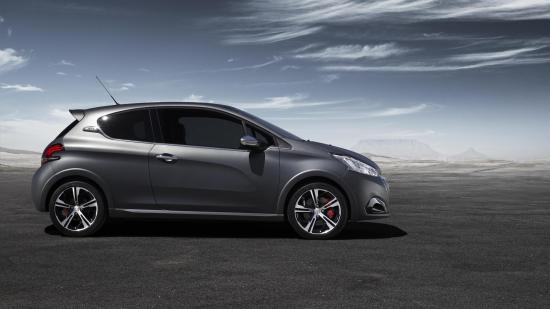0-100: 6.5 s
0-130: 10.1 s
0-160: 15.3 s
0-200: 26.4 s
1/4 mile: 14.76 s
Top speed: 230 km/h
https://www.flickr.com/photos/dedethecollector/28382779369/

Peugeot 208 GTI (208 PS) specs
| Car type | Compact |
| Curb weight | 1299 kg (2864 lbs) |
| Introduced | 2015 |
| Origin country | France |
| Views | 5.9k |
| Submitted by | FastestLaps |
Lap times
Powertrain specs
| Engine type | Inline 4 turbo |
| Displacement | 1.6 l (98 ci / 1598 cc) |
| Power | 208 ps (205 bhp / 153 kw) @ 6000 rpm |
| Torque | 300 Nm (221 lb-ft) @ 3000 rpm |
| Power / liter | 130 ps (128 hp) |
| Power / weight | 160 ps (158 bhp) / t |
| Torque / weight | 231 Nm (170 lb-ft) / t |
| Transmission | 6 speed manual |
| Layout | front engine, front wheel drive |
208 GTI competition
Inline 6 rules 7y ago
atlas 8y ago
this model is over 100kg heavier than the 30th anniversary model but the performance stats are almost identical....why ? the corsa vxr 2016/17 modelsare also 100kg more than the previous model but the stats are the same.. again why?
Tadas 3y ago
In terms of acceleration, weight doesn't make much difference when looking at small changes such as the 100kg you mentioned. At higher speeds weight has almost zero effect on acceleration. In acceleration from a standstill the heavier car can also have an advantage as the extra weight pushes down on the tyres more giving the car more traction so it can put more power down but this gets cancelled out slightly later where the lighter car will catch slightly due to its lower weight.
FastestLaps 3y ago @Tadas
heavier car can also have an advantage as the extra weight pushes down on the tyres more giving the car more traction
This is not really advantage because it is cancelled out by the extra effort needed to accelerate the mass. So the end result can sometimes be the same. For example, if you added or removed 200 kg from a Tesla Model S, the 0-60 mph would probably not change.